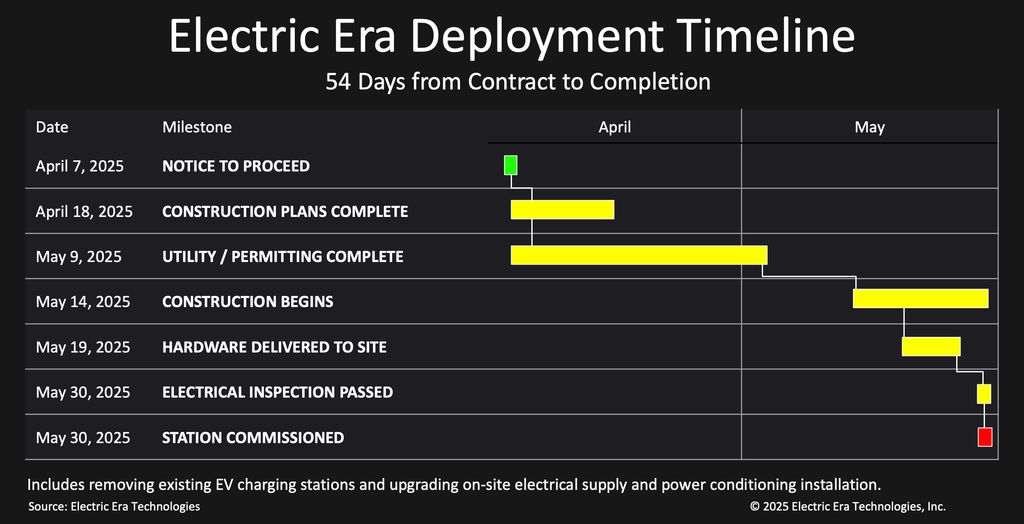- Seattle-based DC fast-charging provider Electric Era installed a charging station at a North Port, Florida Costco location in just 54 days.
- The station includes three 200-kilowatt EV charging stalls.
- Normally, installing charging stations can take up to half a year, if not more.
Public DC fast chargers are designed to get electric-vehicle drivers back on the road quickly. They’re also notorious for not getting built with much haste themselves.
But anyone who charges up at the Costco location in North Port, Florida should know that they’re enjoying the perks of a project that went up at breakneck speed.
Seattle-based EV charging provider Electric Era told InsideEVs that its new station at the big-box retailer went up in what may be a new industry record: a mere 54 days from start to finish. The project broke ground on April 7 and went live on May 30, company officials said.
Now, North Port’s EV drivers can enjoy three 200-kilowatt chargers with six plugs during their next shopping trip or road trip break. The North Port station includes three CCS plugs and three Tesla-style North American Charging Standard (NACS) plugs.
“We’re always trying to push that bar down,” Kyler Schmitz, the Chief Revenue Officer of Electric Era, said of the company’s installation-time goals. “Even in the worst-case scenarios where we look at [the rate of] EV adoption, there are more EVs being sold than there are DC fast chargers being installed, and that gap is growing.”
Thanks to permitting issues, coordinating between business owners and various local government entities, power supply challenges and other types of red tape, fast chargers can often take months or even the better part of a year to build. And every charging site can have its own specific variation on those needs.
Last year, the Biden administration’s National Electric Vehicle Infrastructure (NEVI) program was a frequent punching bag during the election over the millions of dollars in taxpayer money spent to yield only a few charging stations nationwide. (The North Port Costco project was not a NEVI one, officials said.)
Recent data suggests EV charger construction and installation is starting to accelerate, however; data from the charging data analytics firm Paren indicates 2025 will end with 3,000 more plugs installed than last year.
Photo by: Electric Era
In Electric Era’s case, company officials said their proprietary technology is a big part of why this Costco station went up so quickly. The company’s chargers draw from both the electric grid and a shared pool of battery-energy storage, and its vertically-integrated hardware and software stack manages that energy flow to ensure reliability. “Our solution is unique in that we can draw from the grid and the battery simultaneously,” Schmitz said. Other chargers that operate this way may rely on grid limits when their storage batteries are depleted.
“If demand charges are high, so the cost of electricity is high, we can lend more energy from the battery. If the grid connection is not supporting the amount of power requirements drawn from the vehicles, we can supplement that with the battery,” Schmitz added.
This allows Electric Era to get a station like the North Port one up relatively quickly. “A lot of other providers have to upscale the grid, they have to get a different transformer on site, some of the lead time on that can take years,” Schmitz said. And while Florida’s somewhat more laissez-faire approach to various regulations may help this process somewhat, Schmitz said Electric Era just did a similar site in Washington, where the deployment time was only about 10 weeks.
The company’s internal studies indicate that charging installations can often take between 48 and 156 weeks from start to finish.

Photo by: Electric Era
So while this particular project may be somewhat unique to Electric Era, it does show that the entire charging industry seems to be getting more serious about getting stations up quickly. And it’s a bit of good news for the EV industry amid a year when it’s facing a loss of incentives and even proposals like tax penalties for electric drivers. Despite industry headwinds, Schmitz said Electric Era has about 20 other sites built or near completion and about 30 more in development.
“We’re going to keep charging ahead, one way or another,” Schmitz said.
Contact the author: patrick.george@insideevs.com
Read the full article here



